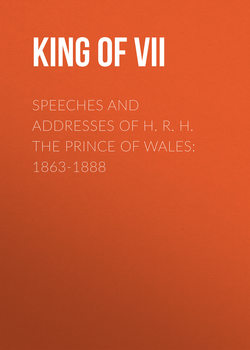Читать книгу Speeches and Addresses of H. R. H. the Prince of Wales: 1863-1888 - King of Great Britain Edward VII - Страница 30
THE ROYAL GEOGRAPHICAL SOCIETY
ОглавлениеMay 24th, 1869
Of all the "learned societies" in London, the Royal Geographical is the most popular. Perhaps it is because there is less "book learning" required for its membership, than that love of travel, enterprise, and adventure, which characterizes all true Englishmen. Professor Owen once said that in the new Hall of the Geographical Society a statue of 'Robinson Crusoe' should be the central figure. It was a wise and suggestive, though humorous proposal, for few geographers have not received early impressions from Defoe's immortal book. The whole globe is embraced in the objects of the Society, whether in the Old World or the New, whether the explorations are in the frozen regions of the Pole, or in the deserts and forests of tropical Africa.
The anniversary meeting of the Society was held on the 24th of May, 1869, in the Royal Institution, under the Presidency of Sir Roderick Murchison, to whose energy and enthusiasm geographical discoveries, and the prosperity of the Society, have been so largely due.
When the health of the Prince of Wales, as their Royal vice-patron was given, the President referred to the appointment of Sir Samuel Baker, the Society's medallist of the year, to the government of Equatorial Africa. The good-will and patronage of the Viceroy in this instance was essentially obtained through the personal influence of the Prince of Wales. Among the guests at their table was the young Egyptian Prince Hassan.
His Royal Highness the Prince of Wales said: —
"Sir Roderick Murchison, your Highness, my Lords, and Gentlemen, – Under any ordinary circumstances it would have given me great pleasure to be present at this interesting meeting – the anniversary dinner of the Royal Geographical Society; but I feel doubly proud to be here this evening as a vice-patron of so useful and celebrated an institution. Sir Roderick Murchison has had the kindness to allude to me as a traveller; I can only say that I feel ashamed almost to stand here with the name of a traveller, when I see around me so many distinguished persons who have travelled, I may almost say from one end of the world to the other. But I cannot be too grateful that my lamented father at an early period gave me an opportunity of travelling and seeing foreign countries; and the same permission being granted to my brother, I feel certain that we have both derived great benefit from seeing those interesting countries which it has been our happiness to visit. No doubt much knowledge and learning may be obtained by reading books of foreign travel, but I feel convinced that all those gentlemen who are members of this society will coincide with me when I say that you cannot form so full or favourable an idea of the countries described by reading of them in books as you can by visiting them yourselves.
"I am greatly flattered and deeply sensible of the kind manner in which Sir Roderick Murchison has mentioned me in connexion with the name of one whose presence we must all very much miss this evening – I mean my late travelling companion, Sir Samuel Baker. I cannot but regret that he was forced to leave this country rather suddenly in order to make arrangements for his great and important undertaking, and could not, indeed, take farewell of all his friends. Sir Roderick has stated that I was in some way instrumental in helping Sir Samuel Baker to carry out the enterprise in which he is engaged. His Highness the Viceroy of Egypt, I know, has deeply at heart the great importance of that noble enterprise – to put down slavery on the White Nile, and I need hardly tell you that anything I could do in the matter was done with the utmost pleasure and satisfaction. Such an enterprise must meet the approval not only of every Englishman, but of every philanthropist. There are great difficulties connected with it. These difficulties must be great to any one, and they must still be more trying to a European; but I know Sir Samuel Baker to be a man of energy and perseverance, and whatever the difficulties he may have to encounter he is certain, if it lies in his power, to attain the end of his mission."
We may here say that when Sir Samuel Baker gave a detailed account of his experiences, in the Hall of the London University, the Prince moved the vote of thanks, in a speech equally eulogistic.
The Prince again rose after the toast of "The Army and Navy, and Auxiliary Forces," had been given. He apologised for responding for the Army, in presence of so many distinguished officers: but he spoke by command of the President, and a soldier's first duty is obedience.
Admiral Sir George Back, the veteran Arctic explorer, and a leading officer in the Society, returned thanks for "The Navy."
The President next proposed the health of Professor Nordenskiold, of Stockholm, and of Mrs. Mary Somerville. The former received "the Founder's" Medal, for his Arctic discoveries; and to Mrs. Somerville, then in her eighty-ninth year, had been awarded the Patron or Victoria Medal, for her scientific and astronomical researches, and her works on physical geography.
Sir Roderick then proposed the health of Professor Owen, and the Duke of Sutherland, and Dr. Russell, who had been companions of the Prince in his Egyptian journey. Dr. Russell had, through the Times, been the reporter and historian of the expedition. The speech of Professor Owen was in happiest vein. Indeed, the whole of the speeches of the meeting, including those of Sir Francis Grant, the Duke of Sutherland, Dr. Russell, and Sir Henry Rawlinson, who proposed the health of the President, made this a memorable anniversary of the Society.
